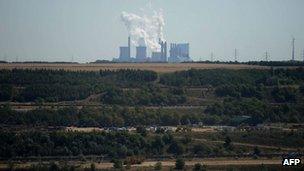RWE to close or idle power plants
- Published

Power plants in Germany and the Netherlands will be affected
German power giant RWE says it will mothball or shutdown some of its gas and coal-fired power stations because of an increase in renewable energy.
The company said a boom in solar energy meant many of its power stations were no longer profitable.
A total of 3,100 megawatts of generating capacity will be taken off line, representing about 6% of RWE's total capacity.
Separately its Npower business in the UK posted a fall in half-year profits.
Tighter margins
RWE is one of the biggest energy generators in the world. Its power stations affected are in Germany and the Netherlands.
German rival E.On has also begun taking generating capacity off line.
"Due to the continuing boom in solar energy, many power stations throughout the sector and across Europe are no longer profitable to operate," RWE said in a statement, external.
"During the first half of 2013, the conventional power generation division's operating result fell by almost two-thirds. The massive reduction in power station margins is a major factor in this development."
On Tuesday, E.On said it had shut down or left idle 6,500 megawatts of generating capacity.
It had previously announced plans to close a total of 11,000 megawatts, but now says it may close more.
'Major changes'
Meanwhile, RWE said its UK operations, Npower, had seen a 3% fall in operating profits to £176m (206m euros) in the first half of 2013.
The company said new government regulations that require energy firms to simplify their tariffs and pay for energy saving measures in consumers' homes had weighed on profits.
However, the prolonged cold weather in the second quarter enabled the company to increase its gas revenues in the UK by 11%.
Npower put up its gas prices by 8.6% last November.
Paul Massara, chief executive of Npower, also hinted at possible job losses in the near future, as part of its programme of reducing costs.
"To do this we need to make some major changes and, although some of these will be difficult, I believe it's the right thing for both our customers and our business," he said.
"As part of our ongoing commitment to maintain open dialogue with our people, and where people are affected, we will continue to consult with them and their representatives first and avoid compulsory redundancies, wherever possible," he added.
- Published13 August 2013
- Published10 July 2013